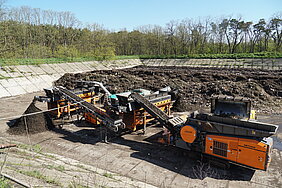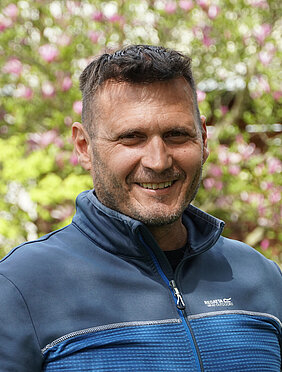Michael Wiese, owner of Wiese Umwelt Service GmbH, in an interview.
With effect from May 1st, 2023, the amendment to the Biowaste Directive has come into force, with consequences: Contaminants, especially plastics, have to be kept out of the biowaste treatment processes, such as fermentation and composting, from the outset: In this context and in order to reduce the enormous disposal costs of the screened residues that have accumulated up till now, Wiese Umweltservice, a regional waste management company based in Berga, Thuringia, decided more than a year ago to invest in the Doppstadt mobile-modular processing (MMAK) concept. The company composts appr. 25,000 ??? of biowastes per year – with tendency to rise - at its site in Polte Ringfurt.
In an interview, company owner Michael Wiese explains the benefits of the plant concept and the reasons for the decision to invest in this plant concept.
Mr. Wiese, how has your company developed in recent years?
We are a typical family business. I started in the company in 1999 and built up the composting facilities bit by bit. At that time, we had a 2,000 square meters area and now our site extends over 55 hectares, where we process around 350,000 tons of biowaste and sewage sludge per year. In total, we operate eleven plants in three German states: Saxony, Saxony-Anhalt and Thuringia, where we employ around 60 people.
Did the cooperation with Doppstadt come about because of the rapid growth?
Yes, among other things. We needed more efficient plant concepts to handle the volume of orders. But the actual trigger was both the changed legislation, i. e. the amendment to the organic waste directive and the dramatically increased disposal costs for the accrued screenings. After our inquiry, the Doppstadt team promptly came to the site and set up a test facility for a two weeks period thus enabling us to test the processing concept for practical suitability with regard to our requirements. We are completely satisfied with it. Today I can say: the cooperation with Doppstadt is great. There is a good chemistry between us.
Due to current events: An amendment to the Organic Waste Directive came into force on May 1, 2023. What changes did this involve and how does the MMAK help to meet the requirements?
The most important aspect for us is the stipulation that the proportion of contaminants in organic compost must not exceed two percent. It was previously 5 percent, so it has more than halved. This aspect involves technical challenges. In this matter, the MMAK impresses by removing the contaminants and foreign substances contained in the organic waste before the actual composting process.
We did not find any other supplier offering a comparable plant concept that meets the crucial criteria of legal certainty, economic efficiency, high output quality and flexibility.
Has the use of MMAK also resulted in a higher quality of the finished compost?
Yes, a higher quality is clearly visible. The coarse materials are not even processed. This means that the material is much finer from the beginning and there are no visible plastic parts in the organic compost. The difference is also clearly visible for our customers. In addition, the pretreatment of the organic waste resulted in a reduction of the throughput time of the rotting process by approximately 4 weeks.
What effect does higher quality have on profitability?
We don't have any sales problems because the quality is high. We also have much less screening residues and therefore lower disposal costs. This aspect is important for us in view of the energy crisis.
Can the financial advantage of MMAK be expressed concretely in numbers?
Yes absolutely. Before purchasing the MMAK and in cooperation with Doppstadt, we calculated potential savings of up to 600,000 euros per year. We are very satisfied because in practice we actually end up with more savings than the savings calculated at the time. We recover the amount that we pay to the bank each month to finance the MMAK four times thanks to the savings. Therefore, the investment is already paying off.
How efficiently does the MMAK work in day-to-day business?
Clear answer: Very efficiently. A simple comparison: With our old machines, it took up to two weeks to screen an order. We can now process the same amount in one or two days. We didn't expect such a difference, but of course we were pleasantly surprised. We have made an enormous leap compared to our competitors.
Let's take a look into the future: Are you planning further investments in this area?
A lot is happening in our industry right now. There is a tendency towards fermentation plants because methane and thus gas can be produced from organic waste. This is a completely different process. We will continue to observe how the market develops. We are currently happy with our latest investment. We'll see what comes next.
We are very happy about that. Thank you for the interesting insights.
You’re welcome!
Watch the video of this system in use at Wiese Umwelt Service GmbH: VIDEO


